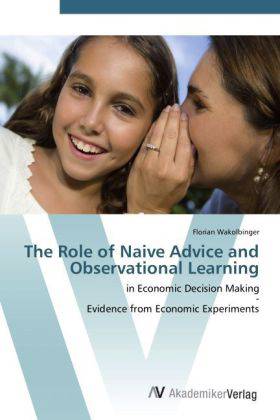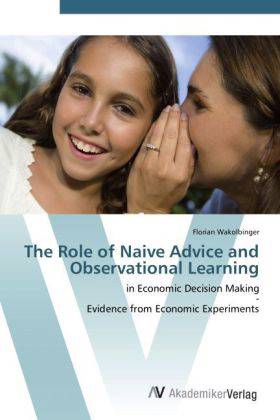
Bedankt voor het vertrouwen het afgelopen jaar! Om jou te bedanken bieden we GRATIS verzending (in België) aan op alles gedurende de hele maand januari.
- Afhalen na 1 uur in een winkel met voorraad
- In januari gratis thuislevering in België
- Ruim aanbod met 7 miljoen producten
Bedankt voor het vertrouwen het afgelopen jaar! Om jou te bedanken bieden we GRATIS verzending (in België) aan op alles gedurende de hele maand januari.
- Afhalen na 1 uur in een winkel met voorraad
- In januari gratis thuislevering in België
- Ruim aanbod met 7 miljoen producten
Zoeken
The Role of Naive Advice and Observational Learning
in Economic Decision Making - Evidence from Economic Experiments
Florian Wakolbinger
Paperback | Engels
€ 60,95
+ 121 punten
Omschrijving
Revision with unchanged content. We examine the effects of observational learning and naïve advice on the quality of decision-making in interactive tasks and decisions with ethical aspects. Although many everyday decisions are influenced by receiving advice or by observing others, little is known about the comparative impact of these types of information. Chapter 1 introduces the topic, chapters 2 and 3 report the results of two experimental beauty-contest games in which either one or all subjects receive advice or observe others' past behavior. We find that subjects receiving advice outperform uninformed subjects permanently, whereas subjects who observe others before making their decision do only have a temporary advantage. Chapter 4 presents a tax-evasion experiment and distinguishes between advice of subjects and observing statistics about subjects that show either high or low compliance. Presenting such information increases evasion, even if it comes from the sample showing relatively high compliance. Advice has a bigger impact than observing others and subjects focus on selfish payoff maximization rather than morale when giving advice. Chapter 5 concludes.
Specificaties
Betrokkenen
- Auteur(s):
- Uitgeverij:
Inhoud
- Aantal bladzijden:
- 104
- Taal:
- Engels
Eigenschappen
- Productcode (EAN):
- 9783639441093
- Verschijningsdatum:
- 11/07/2012
- Uitvoering:
- Paperback
- Formaat:
- Trade paperback (VS)
- Afmetingen:
- 152 mm x 229 mm
- Gewicht:
- 163 g

Alleen bij Standaard Boekhandel
+ 121 punten op je klantenkaart van Standaard Boekhandel
Beoordelingen
We publiceren alleen reviews die voldoen aan de voorwaarden voor reviews. Bekijk onze voorwaarden voor reviews.









